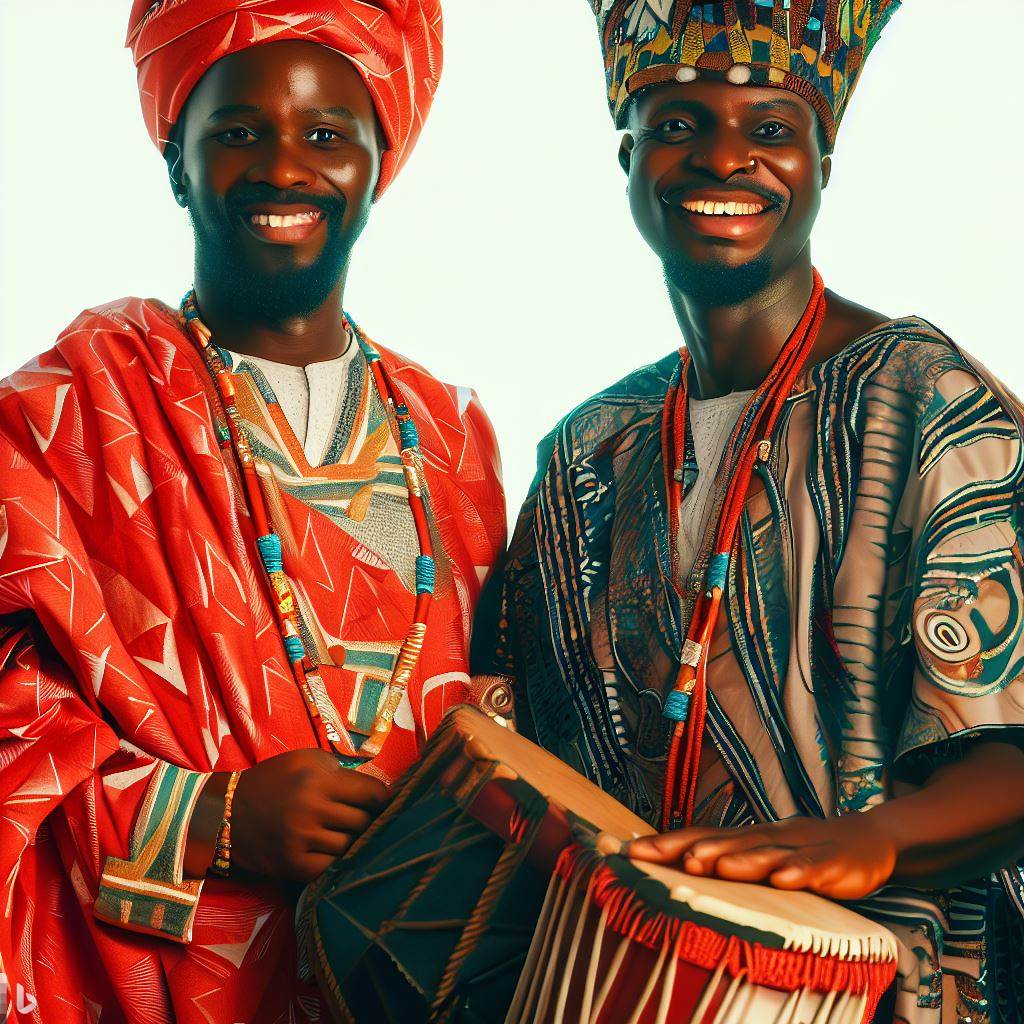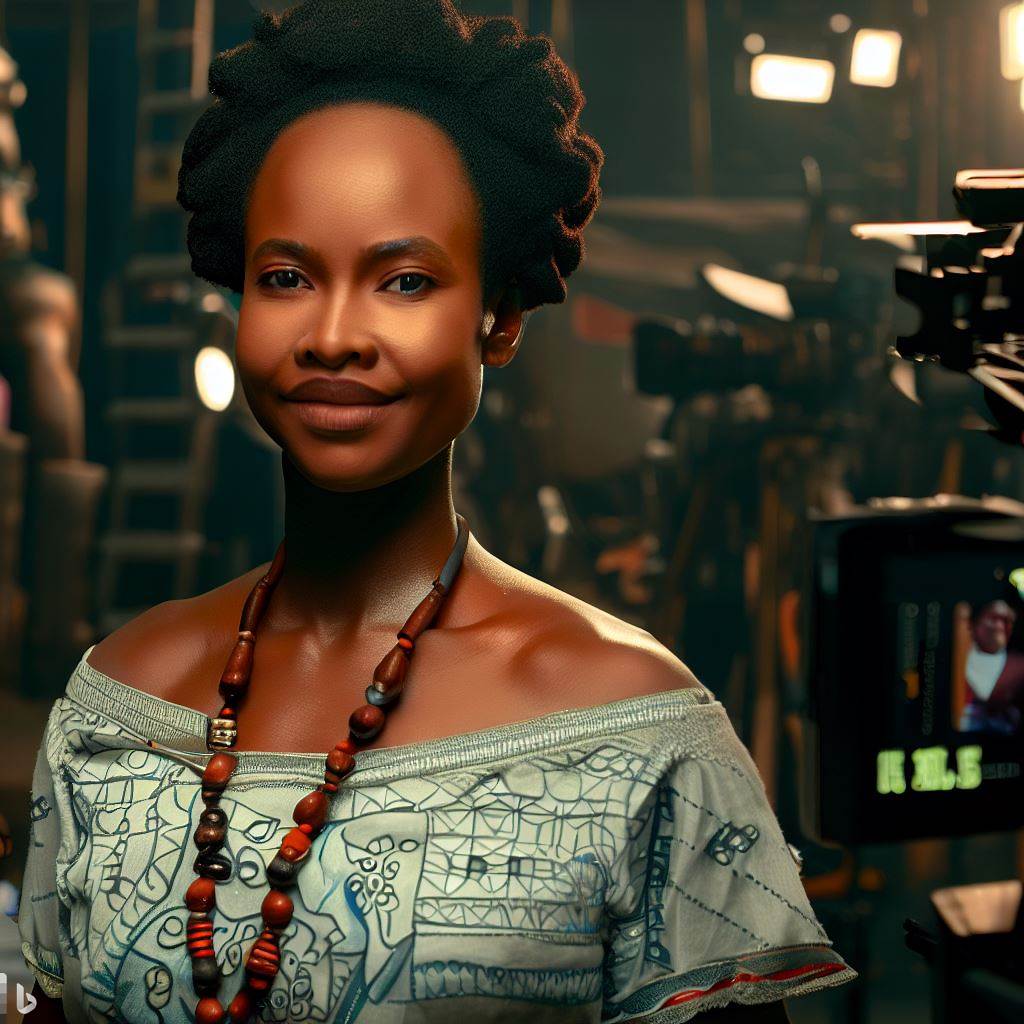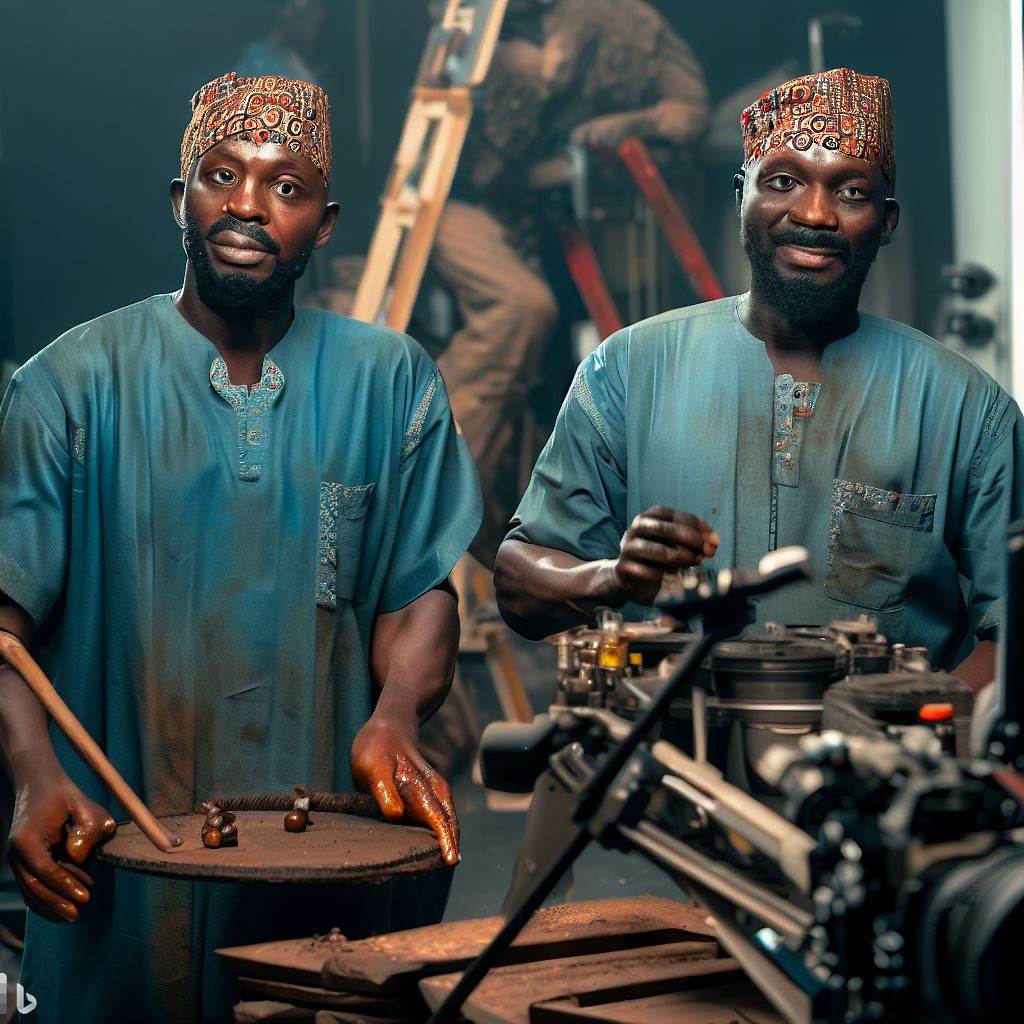Introduction
Let’s explore the music directors’ contribution to Nigerian cultural heritage.
Music directors in Nigeria play a pivotal role in preserving and promoting the nation’s cultural heritage.
They orchestrate performances of traditional Nigerian music forms, fostering a harmonious blend of cultural values.
These directors collaborate with artists, composers, and musicians to create authentic recordings. They organize workshops, festivals, and concerts, uniting Nigerian artists and audiences.
As ambassadors of Nigerian culture, they educate youth, ensuring the continuity of traditional music.
By mentoring aspiring musicians, they uphold Nigeria’s musical legacy, bridging generations and nurturing cultural identity.
Defining Music Directors
Explanation of the role of a music director
- A music director is responsible for overseeing the musical aspects of a performance or production.
- They interpret the music score, select and guide musicians, and shape the overall musical experience.
- Music directors work closely with composers, conductors, and performers to achieve the desired artistic vision.
Responsibilities and tasks of a music director in Nigeria
- In Nigeria, music directors play a vital role in the country’s vibrant and diverse music industry.
- They collaborate with artists and bands, arranging and conducting music for recordings, concerts, and events.
- Music directors also oversee rehearsals, ensuring musicians and vocalists perform at their best.
- They are skilled in various musical genres, including traditional Nigerian music, popular music, and fusion styles.
- Music directors in Nigeria often mentor and train aspiring musicians, passing down cultural knowledge and skills.
Importance of their position in preserving cultural heritage
- Music directors play a crucial role in preserving Nigeria’s rich cultural heritage through their work.
- They promote traditional Nigerian music and ensure its continued presence in contemporary music scenes.
- By incorporating indigenous instruments, rhythms, and melodies, music directors preserve cultural authenticity.
- They collaborate with traditional musicians, ensuring that ancient musical practices are passed down through generations.
- Music directors actively contribute to the preservation and celebration of Nigeria’s cultural identity through music.
In general, music directors in Nigeria have a significant impact on preserving the country’s cultural heritage.
They hold the responsibility of guiding and shaping the musical experiences of performances and productions.
Their tasks range from selecting musicians and interpreting musical scores to mentoring aspiring musicians.
They actively participate in promoting and preserving traditional Nigerian music, ensuring its continued presence and authenticity.
Through their collaborations with traditional musicians and incorporation of indigenous elements, they contribute to the preservation of Nigeria’s cultural identity.
Music directors are the guardians and champions of Nigerian cultural heritage through their dedication and expertise in music.
Read: Advancements in the Field of Interpretation in Nigeria
Historical Overview of Nigerian Music Directors
Origins and development of music directions in Nigeria
- Music direction in Nigeria traces back to traditional tribal music and cultural practices.
- As colonial influence grew, Western music styles and direction techniques were introduced.
- The fusion of Western and traditional Nigerian music gave rise to unique music directions.
Notable music directors in Nigerian history
- Fela Kuti: A pioneering music director known for developing the Afrobeat genre and promoting social activism.
- King Sunny Ade: A prominent music director popular for his contributions to juju music.
- Ebenezer Obey: A highly respected music director and Juju music icon with numerous hits.
Their impact on Nigerian cultural heritage
- Nigerian music directors have played a crucial role in preserving and promoting the country’s diverse cultural heritage.
- They have introduced new styles and techniques, encouraging creativity and innovation in Nigerian music.
- Music directors have helped bridge the gap between traditional and contemporary music, appealing to a broader audience.
- They have used their platforms to address social and political issues, empowering Nigerians through music.
- Nigerian music directors have inspired and mentored generations of musicians, shaping the country’s music industry.
- Their impact can be seen in the global recognition of Nigerian music, leading to collaborations with international artists.
- Music directors have contributed to the economic growth of Nigeria by creating employment opportunities in the music industry.
- Their influence extends beyond the realm of music, shaping fashion, dance, and cultural trends in Nigeria.
Nigerian music directors have been instrumental in shaping the country’s cultural heritage.
From the origins of music direction in tribal practices to the fusion of traditional and Western music styles, they have contributed to the evolution of Nigerian music.
The impact of notable music directors like Fela Kuti, King Sunny Ade, and Ebenezer Obey cannot be overstated.
Their influence reaches far beyond the music industry, inspiring social change, fostering creativity, and elevating Nigeria’s global reputation.
As Nigerian music continues to thrive, music directors will remain at the forefront, preserving and developing the rich cultural heritage of the nation.
Read: Spotlight: Nigerian Interpreters Making a Global Impact

Music Directors as Guardians of Traditional Nigerian Music
Preservation of traditional music genres
- Music directors play a crucial role in preserving and promoting traditional Nigerian music genres.
- They ensure that the essence and authenticity of these genres are maintained through their compositions and performances.
- By studying and understanding the historical and cultural significance of each genre, they safeguard its traditions.
- Through their expertise, music directors create new compositions that incorporate traditional elements, attracting younger generations.
- Traditional Nigerian music genres like Juju, Highlife, and Afrobeat are kept alive and continue to thrive with the help of music directors.
Role in passing down oral traditions
- Music directors act as custodians of oral traditions by incorporating traditional narratives and stories into their compositions.
- They ensure that the meaning and cultural context of these stories are preserved, passing them down to future generations.
- Through their music, music directors transmit important historical events, values, and messages embedded in oral traditions.
- By collaborating with elder musicians and cultural experts, they learn and share the rich oral traditions of Nigeria.
- Music directors serve as bridges between past and present, keeping the oral traditions alive in the contemporary music landscape.
Contributions to cultural festivals and ceremonies
- Music directors are vital contributors to cultural festivals and ceremonies in Nigeria.
- They curate musical programs that showcase traditional Nigerian music and promote cultural heritage.
- Through their compositions and performances, they enhance the overall experience of these festivals and ceremonies.
- Music directors collaborate with traditional musicians, dancers, and other artists to create mesmerizing performances.
- Their involvement in cultural festivals and ceremonies ensures the continuity and celebration of Nigerian cultural heritage.
Therefore, music directors play a crucial role as guardians of traditional Nigerian music.
They preserve and promote traditional music genres, passing down oral traditions, and contribute to cultural festivals and ceremonies.
Their dedication and expertise ensure the survival and enrichment of Nigerian cultural heritage.
Read: A Guide to Success in Nigerian Stand-up Comedy
Music Directors as Promoters of Contemporary Nigerian Music
Influence on popular music genres
- Music directors play a crucial role in shaping and popularizing different music genres in Nigeria.
- They introduce new styles and fusions of music, giving birth to unique Nigerian sound.
- By selecting and promoting certain genres, music directors create trends that influence public taste.
- Their expertise in identifying emerging music genres helps to diversify and expand the Nigerian music scene.
- Music directors support the development of various genres by showcasing artists who specialize in specific styles.
Collaboration with Nigerian musicians
- Music directors collaborate closely with Nigerian musicians to produce high-quality and commercially successful music.
- They work together to create innovative sounds and experiment with different musical elements.
- Music directors provide guidance and assistance to musicians, ensuring their artistic vision is realized.
- Through collaborations, music directors help Nigerian musicians gain exposure and reach new audiences.
- Joint projects between music directors and musicians contribute to the evolution and growth of Nigerian music.
Contribution to the growth of Nigerian music industry
- Music directors play a vital role in driving the expansion and success of the Nigerian music industry.
- They identify and nurture talented artists, helping them establish their careers in the competitive music market.
- Music directors provide mentoring and support, guiding artists towards achieving their full potential.
- Through their networks and industry connections, music directors create opportunities for Nigerian musicians to thrive.
- They actively participate in music events, festivals, and awards, representing Nigerian music and promoting its growth.
In a nutshell, music directors in Nigeria have a significant impact on the country’s cultural heritage.
Through their influence on popular music genres, collaboration with Nigerian musicians, and contributions to the growth of the music industry, they shape and promote contemporary Nigerian music.
Their efforts result in a diverse and thriving music scene that contributes to the rich cultural tapestry of Nigeria.
Read: How to Break into Nigeria’s Music Industry
Music Directors as Cultural Ambassadors
Representation of Nigerian culture internationally
- Music directors play a crucial role in representing Nigerian culture on the international stage.
- They use their compositions and performances to showcase the richness and diversity of Nigerian music.
- By incorporating traditional Nigerian elements into their music, they promote the country’s cultural heritage.
- Music directors are often invited to perform at prestigious events and festivals, allowing them to present Nigerian culture to a global audience.
- Through their music, they deliver a powerful message about the uniqueness and beauty of Nigerian traditions.
Use of traditional instruments and melodies in compositions
- Music directors often utilize traditional Nigerian instruments in their compositions.
- Instruments like the talking drum, shekere, and kalimba are frequently featured, adding an authentic Nigerian flavor to the music.
- By incorporating these instruments, music directors preserve and celebrate indigenous Nigerian art forms.
- The melodies used by music directors are often inspired by traditional Nigerian music styles such as highlife, juju, and afrobeat.
- These melodies serve as a link between the past and the present, bridging generations and keeping Nigerian cultural heritage alive.
Participation in global music events
- Music directors actively participate in global music events, representing Nigeria on a global scale.
- They collaborate with international artists, creating fusion music that blends Nigerian and foreign elements.
- By sharing stages with renowned musicians from different cultures, they foster cultural exchange and understanding.
- Music directors use these collaborations as an opportunity to showcase Nigerian music and culture to a diverse global audience.
- Their participation in global music events helps to break cultural barriers and promote a sense of unity among nations.
Basically, music directors play a crucial role as cultural ambassadors for Nigeria.
They represent Nigerian culture internationally by incorporating traditional instruments and melodies into their compositions.
Through their performances at global music events, they showcase the richness and diversity of Nigerian music to a global audience.
By actively participating in collaborations with international artists, they foster cultural exchange and understanding.
Music directors are instrumental in preserving and promoting Nigerian cultural heritage, ensuring that it continues to thrive and evolve for future generations.
Challenges Faced by Nigerian Music Directors
Lack of recognition and support
- Music directors in Nigeria often struggle with a lack of recognition for their contributions.
- Many people fail to understand the importance of music directors in preserving Nigerian cultural heritage.
- This lack of recognition leads to a lack of support from the government, media, and society as a whole.
- Without recognition and support, music directors face challenges in promoting Nigerian cultural heritage through their work.
Financial constraints and limited resources
1. Nigerian music directors frequently face financial constraints that hinder their ability to produce quality work.
2. Limited resources and funding make it difficult for music directors to hire the best musicians and ensure top-notch productions.
3. Lack of financial support also affects the promotion and distribution of Nigerian music, both locally and internationally.
4. These financial constraints often force music directors to compromise on the level of professionalism and artistry in their work.
Need for improved policies and infrastructure
- Nigerian music directors face challenges due to the lack of robust policies and infrastructure in the music industry.
- There is a need for better copyright laws to protect the intellectual property rights of music directors.
- Infrastructure for music production, recording studios, and concert venues also needs improvement to support the work of music directors.
- Without adequate policies and infrastructure, Nigerian music directors find it difficult to thrive and contribute to the preservation of cultural heritage.
In fact, Nigerian music directors face several challenges in their efforts to contribute to the country’s cultural heritage.
These challenges include a lack of recognition and support, financial constraints, and limited resources, as well as the need for improved policies and infrastructure.
Addressing these challenges is crucial for the growth and sustainability of Nigerian music, ensuring that cultural heritage is preserved and celebrated.
Conclusion
Recap of the importance of music directors
Music directors play a crucial role in preserving and promoting Nigerian cultural heritage.
Restatement of their contributions to Nigerian cultural heritage
Through their expertise and creativity, music directors have helped shape and define Nigerian music.
Call to action to acknowledge and support the work of music directors in preserving Nigerian culture
It is essential for us to recognize and support the efforts of music directors in preserving Nigerian cultural heritage.
By attending concerts, buying albums, and sharing Nigerian music, we can help ensure its continuity.
Let us celebrate and appreciate the contributions of music directors in preserving Nigerian culture for future generations.




